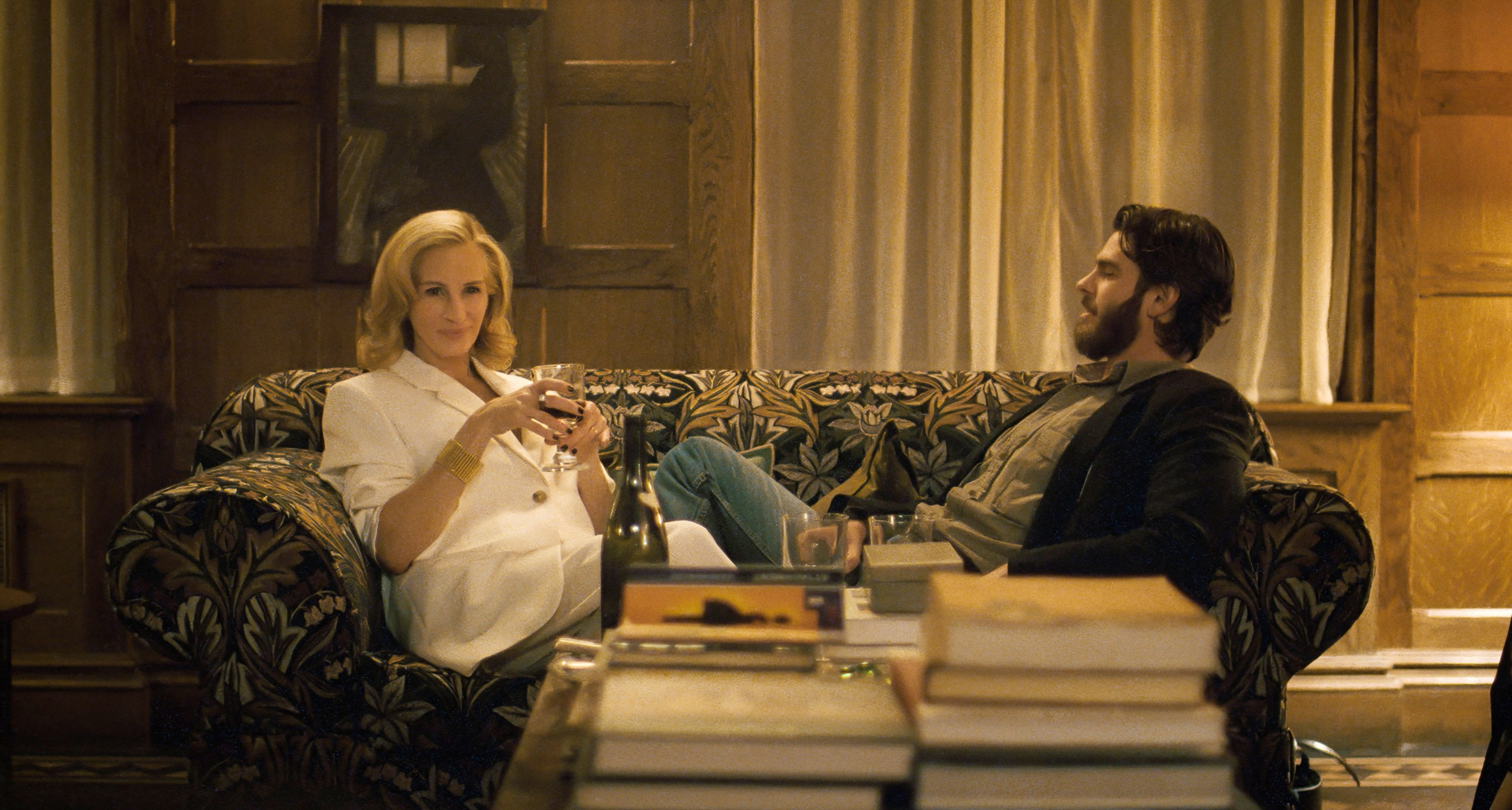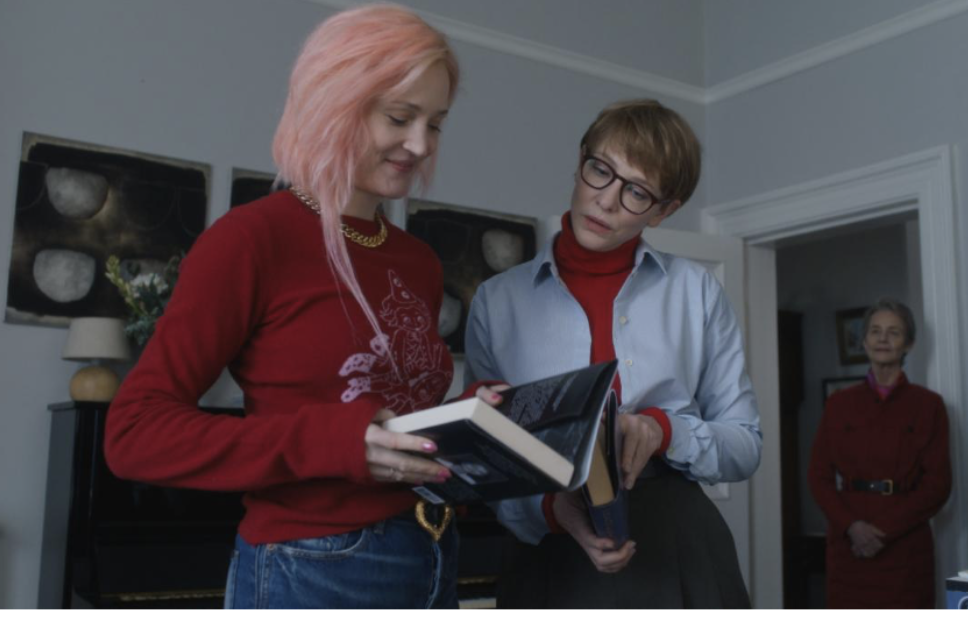You know you’re in for an encounter with somebody who wants to start shit when the opening frames of Luca Guadagnino’s “After the Hunt,” a thriller about a sexual assault scandal that rocks an intellectual community, are styled in the tradition of none other than Woody Allen: white Windsor typeface against a black backdrop, the cast including Julia Roberts and Ayo Edebiri in alphabetical order, and the credits acknowledging said alphabetical order. “It happened at Yale,” the prologue text announces, also evoking the academia-centered mysteries of someone like “The Secret History” author Donna Tartt.
It’s an intriguing provocation from the get-go that Guadagnino would want to announce his new film by calling back to Allen, an artist who has become the poster figure for sexual abuse scandals. That Guadagnino would want to interrogate the rhetoric of how alleged abuse is positioned at all via Allen’s signature is a sit-up-in-your-seat creative choice that nearly hijacks the first moments of this Yale-set drama, about a philosophy professor (Roberts) unraveling amidst her student’s (Edebiri) accusation of sexual assault against a colleague (Andrew Garfield).
But that’s unfortunately about as dangerous as the oddly chaste “After the Hunt” gets despite characteristically invigorating direction from the visionary filmmaker behind at least two masterpieces: “Call Me By Your Name” and “Queer,” two heightened immersions into the subjective state of desire, and maybe a third, “Suspiria,” if you’re willing to go there. “After the Hunt’s” talky, heady unfolding — with a snaking interest in the generational divide between Gen Z youth culture and pre-woke-era Gen Xers — works from a screenplay by first-time feature writer Nora Garrett, who came to Guadagnino’s attention early last year. It’s an overintellectualized script that reduces its characters to broad stand-ins and mouthpieces for hot topics, bizarrely retrograde, and a few beats behind the times in interrogating both the post-#MeToo context of how assault charges are handled, reacted to, and also in untangling a tricky identity politics inquiry that brushes against race and gender issues.
Yale philosophy professor Alma Imhoff (Julia Roberts), like the filmmaker, clearly has a taste for risk, too. Hosting a party chez elle that mixes colleagues and faculty, she nurses a sizable glass of red wine while dressed in a top-to-toe white suit, and it’s likely not the first drink this secretly hard-boozing, self-destructive teacher has had today. Roberts has great fun in a career-recharging dramatic performance — she’s at her most dare-to-be-unlikable since Mike Nichols’ 2004 “Closer” — as a fucked-up, boozing, and eventually pill-popping highbrow with a mystery chronic ailment and perhaps a too-close fondness toward her younger colleague, Hank (a raffish Garfield).
One of her students, Maggie (Ayo Edebiri), is the type to shoot her hand up first in the classroom even when unsure of the answer. She greatly admires Alma but has secrets of her own: In that scene-setting party, Maggie absconds to Alma’s bathroom, and finds an envelope with a photo of a dashing stranger taped under the sink. (Why Alma would hide this photo here, a relic of a hidden life, in New Haven, where she lives with her husband rather than the pied-à-terre she keeps in the city, suddenly revealed in the third act, is unclear.)
In other words, as much as Maggie idolizes her teacher in the way that young people who weren’t loved enough as children project parent-like silhouettes onto their mentors, Maggie also might be building a case against Alma. Soon into the movie, a rain-soaked Maggie shows up, dejected and nerve-jangled, to the home Alma shares with her psychotherapist husband Frederik (Michael Stuhlbarg). Maggie confesses that, on the night of that party, Hank forced himself upon her after walking her home. “He crossed a line,” she says. A skeptical Alma will eventually tell Maggie a very unhelpful version of “if it’s real to you, then it’s real” while trying to balance an allegiance to Hank, who might be in love with Alma. Or is she in love with him, or just idealizing his adoration of her, too, as she does with Maggie’s?
Alma is a victim of her own quest for love, and pieces of information about her past that might inform her reaction to Maggie’s claims unfurl in dribs throughout the movie. Meanwhile, her relationship to Hank is thrown out of orbit, as this very clear accusation of rape alienates them from each other, and Hank from his academic milieu, where he likens himself to a wild animal being chased out of the herd.
Chloë Sevigny, who madly incarnated the freakiest scene out of Guadagnino’s YA cannibal romance “Bones and All” and starred in his HBO series “We Are Who We Are,” has a small role here as student liaison Kim, who keeps the pupils’ confidences as well as a blank prescription notepad in her desk, acting as a kind of guidance counselor. My issue with Garrett’s unsubtle inquiry into the Gen Z vs. Gen X paradigm is no more sourly demonstrated than in a scene where Kim, throwing back a few drinks with Alma at the local dive Three Sheets, gives an on-the-nose remark on just how anachronistic-for-our-times it is that said college bar is blasting music by controversy-magnet, truther-opinioned Morrissey.
In terms of subversiveness and hints at a kinkier underworld beneath the surface, “After the Hunt” feels strangely sanded down: Why not turn up the heat more on the palpable sapphic friction simmering between Alma and Maggie? Lingering close-ups on one another’s hands as they embrace in moments of emotional frankness — and both painted with what seems to be the same nail polish — hint at a relationship that could’ve been explored with more risk. The camera handled by cinematographer Malik Hassan Sayeed, working with Guadagnino for the first time, whooshes around his subjects to indicate the shakiness of their frames of mind. Guadagnino does bring back his regular scoring collaborators, Trent Reznor and Atticus Ross, who might have replayed the plunking, doom-harbinging piano refrain of “Eyes Wide Shut” a few too many times during the brainstorming phase.

Limiting to the actress’s bona fide capabilities, Edebiri’s character is treated mostly as a nuisance, a fly to be swatted off, making the racial politics of her position as a queer Black student whose moneyed parents have endowed the university (thereby throwing Maggie’s inherent academic worthiness into question) especially unresolved and unplumbed. That Maggie’s dissertation — which Hank alleges is plagiarized as he scrambles to gain traction amid his downfall — and field of study is on the resurgence of “virtue ethics” suggests something provocative, more satirical and mischievous up Garrett’s sleeve. But it’s unclear, and not in a piquantly ambiguous way, what Garrett is trying to say here.
The most recent movie “After the Hunt” calls to mind is Todd Field’s “Tár,” similarly a cancel-culturally minded story set within academia, and about a female educator abusing her power. That film succeeded so well, in a way that everyone seemed to get without nose-wrinkling, because of its sense of humor about itself. “After the Hunt” leaves some potential brambles of humor unpricked, like the fact that Maggie just might be dating her nonbinary, trans peer (Lio Mehiel) for the sake of clout. Or when Alma sounds off on Maggie and her partner, asking, “Don’t you have some obscure protest to be publicly angry at?” while repeatedly misgendering Mehiel’s character. It’s more cringe because of its bluntness than intentionally funny and satiristic.
Guadagnino is a beautiful director of jolting power and skill, especially in capturing queer yearning and the psychic collisions of people against their station in life. “Challengers” cranked up the pansexual vibes between a trio of tennis-playing lovers with an unceremoniousness, a sneaky slyness, that actually felt revolutionary, and the supposed age-gap romance of “Call Me By Your Name” remains a subject of hot debate even as the movie now lives as a contemporary classic. The way he has also stood by “Call Me” star Armie Hammer, all but persona non grata after a surge of upsetting harassment accusations of his own, indicates a subversive artist unafraid to go against the grain.
But “After the Hunt” ultimately isn’t against-the-grain enough. It strives for moral ambiguity, but ends up startingly morally stark, pampering the viewer against discomfort in a final coda that feels taped on, after-the-fact reassurance. It pains me to take down a Luca Guadagnino movie — he is one of the best filmmakers working — but “After the Hunt” isn’t enough, its ideas ripped from an earlier time, transposed onto our own with a broad-strokes equivocation about what they want to say.
Grade: C
“After the Hunt” premiered at the 2025 Venice Film Festival. Amazon/MGM Studios opens the film in theaters October 10.
Want to stay up to date on IndieWire’s film reviews and critical thoughts? Subscribe here to our newly launched newsletter, In Review by David Ehrlich, in which our Chief Film Critic and Head Reviews Editor rounds up the best new reviews and streaming picks along with some exclusive musings — all only available to subscribers.



